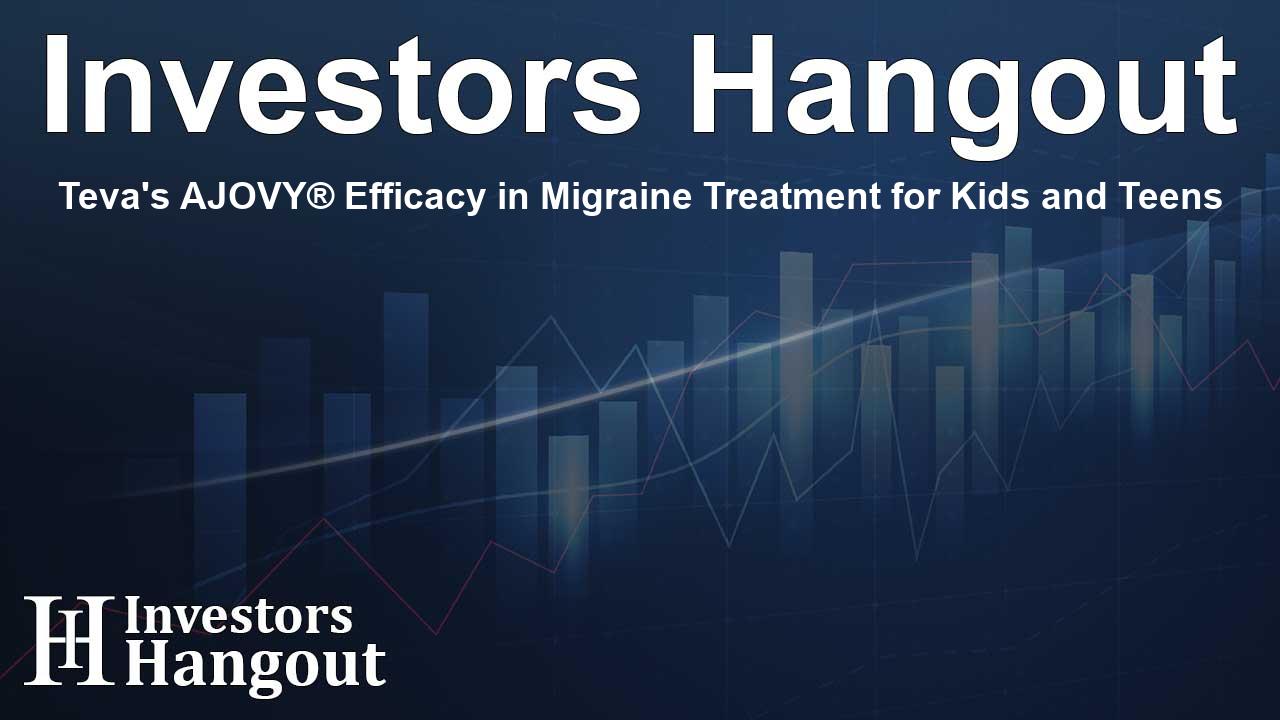Teva's AJOVY® Efficacy in Migraine Treatment for Kids and Teens

Teva Unveils Promising Data on AJOVY® for Pediatric Migraine
Teva Pharmaceutical Industries Ltd. recently shared exciting findings from its Phase 3 SPACE study, focusing on the effects of AJOVY® (fremanezumab) in children and adolescents aged 6-17 years. The study's results are encouraging, showing a significant reduction in both monthly migraine days (MMD) and monthly headache days (MHD) compared to a placebo, signaling a breakthrough in treatment options for young patients suffering from episodic migraines.
Understanding the Impact of AJOVY® in Young Patients
The SPACE trial, which comprised 237 pediatric participants, revealed that AJOVY® effectively decreases the frequency of migraine occurrences, demonstrating a marked improvement over a 12-week period. Specifically, the participants experienced a reduction of -2.5 MMD in comparison to -1.4 days in the placebo group, presenting a statistically significant outcome (p=0.0210).
Moreover, the reduction in monthly headache days was impressive, with fremanezumab achieving a -2.6 difference compared to a -1.5 reduction in the placebo cohort (p=0.0172). This data undoubtedly showcases the potential of AJOVY® as a viable treatment for children and adolescents grappling with the debilitating effects of migraines.
The Significance of Safety in Pediatric Treatments
A crucial aspect of any pharmaceutical development, especially in children, is safety. During the SPACE trial, AJOVY® exhibited a favorable safety profile. The proportion of children experiencing any adverse events was notably similar in both the treatment group and placebo, at 55% and 49% respectively. Additionally, serious adverse events occurred at a minimal rate of ?3%, reinforcing the notion that this medication not only provides efficacy but also maintains safety standards suitable for young individuals.
Expert Opinions on the Findings
Professor Patricia Pozo-Rosich, a leading investigator from the trial, expressed enthusiasm about the study's outcomes. She highlighted the critical need for effective migraine treatments in the pediatric population, noting that this is the first Phase 3 trial showcasing reliable data on a CGRP-pathway treatment for this demographic. Her comments reflect a larger sentiment within the medical community regarding the need to address migraine treatment for children, which has historically been overlooked.
Broader Implications of the SPACE Study Results
The data from the SPACE study holds significant promise for the future of migraine treatments in children. With approximately 7.7% of children affected by migraines, and the frequency increasing among adolescents, the introduction of AJOVY® could profoundly impact the quality of life for many young patients. Reports indicate that migraines often lead to missed school days and hinder social and educational pursuits. Thus, an effective preventative treatment is crucial.
Teva’s Continued Commitment to Innovation
Teva plans to continue investigating the effects of fremanezumab in pediatric patients, delving further into chronic migraine scenarios and evaluating long-term safety measures. With over 120 years of expertise in pharmaceuticals, Teva reiterates its commitment to advancing patient care through innovative treatments, paving the way for better health outcomes.
About AJOVY®
Aimed at preventing migraine in adults with at least four migraine days monthly, AJOVY® has emerged as a valuable option. It is offered in two dosing formats, allowing flexibility for patients—225 mg monthly or 675 mg quarterly. This flexibility extends to administration methods, adaptable for healthcare professionals or at-home use, making it accessible for various patient needs.
Frequently Asked Questions
What is AJOVY® and its primary use?
AJOVY® (fremanezumab) is a medication aimed at preventing episodic migraines in adults and now shows promise for use in children and adolescents.
How did the SPACE study measure effectiveness?
The SPACE study measured effectiveness by comparing reductions in monthly migraine days and headache days between patients treated with AJOVY® and those given a placebo.
What were the safety findings from the SPACE trial?
The safety findings indicated that adverse event rates were comparable between the treatment and placebo groups, suggesting a favorable safety profile for childhood use.
Are there age restrictions for AJOVY®?
AJOVY® is indicated for pediatric patients aged 6-17 years, as demonstrated in the SPACE trial.
What is Teva's future direction for AJOVY®?
Teva is planning further research into the impacts of fremanezumab in treating chronic migraines in children, focusing on long-term safety and effectiveness.
About Investors Hangout
Investors Hangout is a leading online stock forum for financial discussion and learning, offering a wide range of free tools and resources. It draws in traders of all levels, who exchange market knowledge, investigate trading tactics, and keep an eye on industry developments in real time. Featuring financial articles, stock message boards, quotes, charts, company profiles, and live news updates. Through cooperative learning and a wealth of informational resources, it helps users from novices creating their first portfolios to experts honing their techniques. Join Investors Hangout today: https://investorshangout.com/
Disclaimer: The content of this article is solely for general informational purposes only; it does not represent legal, financial, or investment advice. Investors Hangout does not offer financial advice; the author is not a licensed financial advisor. Consult a qualified advisor before making any financial or investment decisions based on this article. The author's interpretation of publicly available data shapes the opinions presented here; as a result, they should not be taken as advice to purchase, sell, or hold any securities mentioned or any other investments. The author does not guarantee the accuracy, completeness, or timeliness of any material, providing it "as is." Information and market conditions may change; past performance is not indicative of future outcomes. If any of the material offered here is inaccurate, please contact us for corrections.